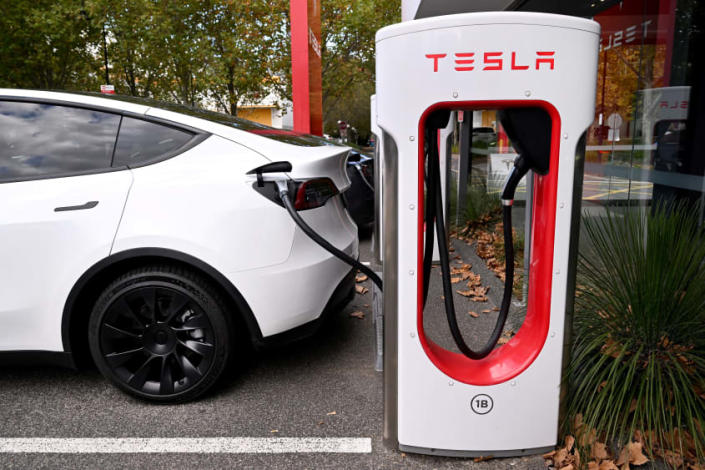
The smartest insight and analysis, from all perspectives, rounded up from around the web:
The Environmental Protection Agency wants to remake the auto industry, and that's a very good thing for the planet, said the Los Angeles Times in an editorial. New rules proposed last week would effectively require that automakers electrify two-thirds of their passenger vehicles by 2032. Commercially, too, "about half of new buses, garbage trucks, and delivery vans" and up to 35 percent of new heavy-duty trucks would be zero-emission if the EPA gets its way. The agency estimates that swapping out that many combustion engines "would avoid putting into the atmosphere nearly 10 billion tons of carbon emissions." There are still many questions about supply-chain readiness, charging stations, and consumers' attitudes toward EVs, which made up less than 6 percent of vehicle sales last year. But the EPA shouldn't have to "wait for all problems to be solved" before pressing forward. "Regulations drive results, and the planet needs results quickly."
The Biden administration "is remaking a major industry in a way that is unprecedented in a free-market economy," said The Wall Street Journal in an editorial. Last month, the Energy Information Administration forecast that EVs will make up only 15 percent of sales in 2030. Forcing an additional 50 percent is "Chinese-style central planning." If Democrats say EVs are the future, why does the government have to mandate them? As it stands, the proposal has automakers trapped between the EPA's demands and the Treasury Department, said Liam Denning in Bloomberg. To reduce reliance on China, the Inflation Reduction Act included a much-needed $7,500 tax credit for EVs. But "to reap the benefits, EVs and their components need to be made or mined in America." Right now, "much of what goes into EVs is made" predominantly in China. Rewiring and reshoring the supply chain comes at a "substantial cost."
Yes, there are costs, but the aggressive targets can be achieved, said Nitish Pahwa in Slate. EV sales are already soaring, and last year "saw a 65 percent leap in electric sales," even though supply-chain shortages pushed up prices. "Cities are rapidly installing chargers on streets and buildings" to allay concerns about range. Meanwhile, batteries are improving enough in efficiency so you can travel further without charging. It's not like this caught automakers off guard, said Stephen Wilmot in The Wall Street Journal. They are "losing business to Tesla." And they have already been investing billions in electric manufacturing, in part because of regulations overseas, where the European Union and U.K. are moving decisively toward outright bans on new gas vehicles in the next decade.
Many consumers remain on the fence about battery-powered cars, said Josh Kraushaar in Axios. A Gallup poll released last week found "just 12 percent of Americans are seriously considering buying" an EV, and 41 percent "said they'd never buy one." Despite the environmental benefits, the EPA would essentially be compelling consumers "to buy vehicles that currently are more expensive and have less driving range than traditional cars." The "big green gamble" comes with the risk that it will be a tough sell for Democrats in 2024.
This article was first published in the latest issue of The Week magazine. If you want to read more like it, you can try six risk-free issues of the magazine here.
You may also like
Texas Senate approves bills requiring 10 Commandments in K-12 classrooms, Bible time in school
The U.S. and China want to 'decouple' their economies. Is it possible?
Ice sheets in Greenland and Antarctica are melting at a 'disastrous' pace
Read Again https://news.google.com/rss/articles/CBMiSWh0dHBzOi8vbmV3cy55YWhvby5jb20vYXV0b3MtZmFzdC10cmFja2luZy1lbGVjdHJpYy1mdXR1cmUtMDk1MjA3MzYwLmh0bWzSAVFodHRwczovL25ld3MueWFob28uY29tL2FtcGh0bWwvYXV0b3MtZmFzdC10cmFja2luZy1lbGVjdHJpYy1mdXR1cmUtMDk1MjA3MzYwLmh0bWw?oc=5Bagikan Berita Ini















0 Response to "Autos: Fast-tracking the electric future - Yahoo News"
Post a Comment